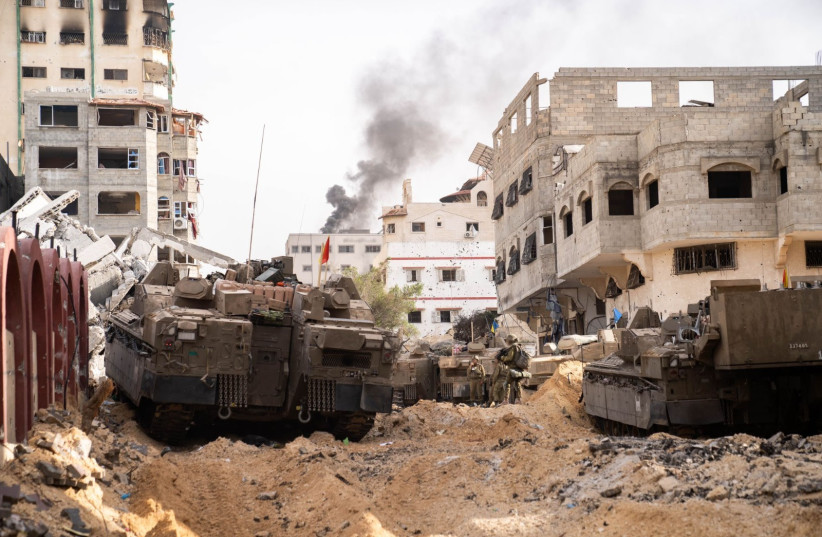Eliran Mizrahi, a 40-year-old father of four, reported for duty to the Gaza Strip shortly after the October 7 massacre, but he did not come back the same, his family told CNN.
Mizrahi struggled with PTSD for six months after his return and died by suicide shortly before he was supposed to be redeployed.
“He got out of Gaza, but Gaza did not get out of him. And he died after it, because of the post-trauma,” his mother, Jenny Mizrahi, told CNN.
In the wake of the Israel-Hamas war and with tensions steadily rising on the Northern front, thousands of Israelis have struggled with their mental health, especially those serving in the IDF. In January, Walla reported that 1,600 IDF soldiers had shown symptoms of combat-related PTSD since the start of the war.
Of those, 76% returned to combat duties after receiving treatment from mental health officials attached to their units stationed near combat zones.
The IDF has not provided an official figure on the number of soldiers who have taken their own lives, but it says that it has been tirelessly working to treat the mental health concerns of service members.

Survivors and their loved ones are saying that this isn't the case.
“They didn’t know how to treat them (soldiers),” Jenny, who lives in Ma’ale Adumim, told CNN. “They (soldiers) said the war was so different. They saw things that were never seen in Israel.”
Survivor's testimonies
When Mizrahi was on leave, he withdrew socially, and suffered from bouts of anger and insomnia, his family said.
“He always said 'no one will understand what I saw',” his sister, Shir, told CNN.
“He saw a lot of people die. Maybe he even killed someone. (But) we don’t teach our children to do things like this,” Jenny said. “So, when he did something like this, maybe it was a shock for him.”
During his service in Gaza, Mizrahi drove a D-9 bulldozer, an armored vehicle that can withstand bullets and explosives.
His friend and co-driver, Guy Zaken, testified before the Knesset in June that the two were ordered to “run over terrorists, dead and alive, in the hundreds" on several occasions.
He says he no longer eats meat because of this. “When you see a lot of meat outside, and blood… both ours and theirs (Hamas), then it really affects you when you eat,” he told CNN, referring to bodies.
Zaken further told CNN that the two saw "very, very, very difficult things,” Zaken told CNN. “Things that are difficult to accept.”
At the June Knesset hearing, PTSD survivors and veterans from the Israel-Hamas war recounted their experiences after ending their service.
"There shouldn’t be any inequality between physical and mental disabilities. I’ve already died once," said Omer Amsalem, a PTSD survivor who fought in Operation Protective Edge in a June meeting with the Knesset. "Why must I come here daily, shouting and complaining like garbage? Why do we keep hearing about another trauma victim who committed suicide? Why do we have to come to you? You should be coming to us at home. You didn’t take care of PTSD victims before, so how will you handle the wounded from Operation Iron Swords? I’m tired of coming here. My peace is only at home, and that’s all I need."
Walla reported that some testifiers felt like the government had forgotten them, and some of them even mentioned Eliran.
"My financial situation is a disaster—I’m a million shekels in debt. I can’t get loans, and soon, I might end up on the street," said Avichai Levy, an IDF veteran and PTSD victim. "My friends are dealing with rocket attacks and gunfire. The ministers ignore us; everyone turns their backs and insults our intelligence.
Additionally, survivors say that they're scared that they will get drafted again with the war's expansion into Lebanon. There have been approximately 760 requests for psychological assistance since the start of the war, though not all were PTSD related, according to a report from Walla.
“A lot of us are very scared of getting drafted again to a war in Lebanon,” an IDF medic who served four months in Gaza told CNN, speaking on condition of anonymity. “A lot of us don’t trust the government right now.”
"How many more like Eliran do you need?" said Levy during the June meeting. "Why are you lying to us? No one cared for us before, and no one is doing it now."
